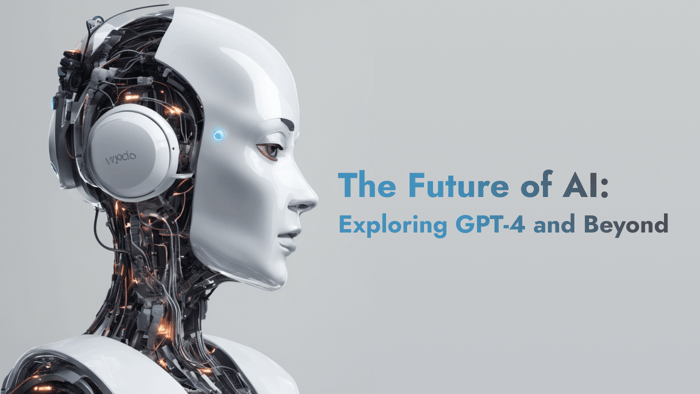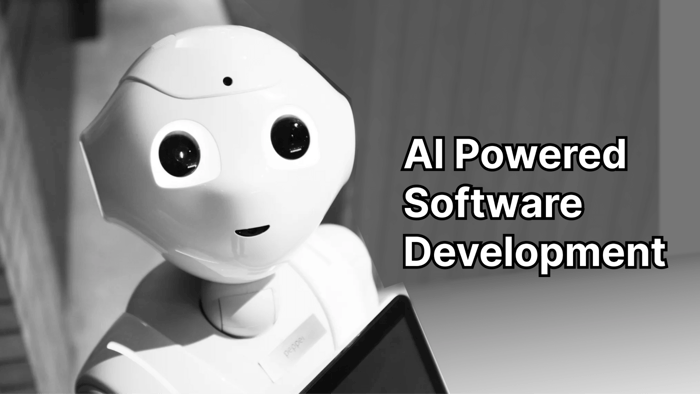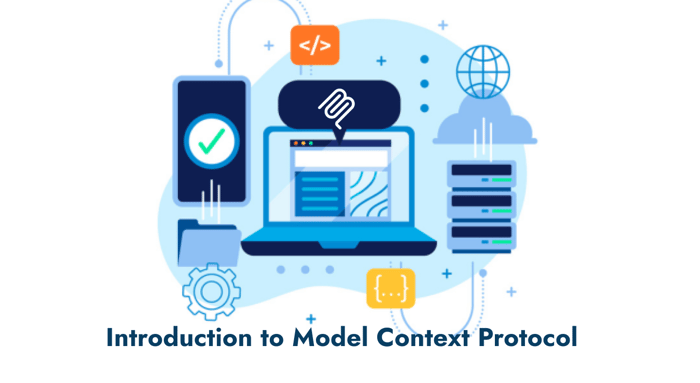Learn about the future of AI and what to expect in the future.
The rise of AI is reshaping the fabric of our daily existence and has become a transformative force with unprecedented potential to revolutionize various industries. The emergence of Artificial Intelligence (AI) has marked the beginning of a new era that goes beyond just automation. Imagine a future where mundane tasks are effortlessly eliminated and replaced by a world where AI not only assists but also organizes, becoming an inseparable part of both our personal and professional lives.
At the forefront of this AI revolution is GPT-4, a cutting-edge language model with capabilities that redefine the boundaries of what we thought possible. Beyond mere automation, GPT-4 signifies a leap into creative content generation, streamlined business operations, and enhanced problem-solving.
This article explores AI, its capabilities and potential impact on diverse industries, showcasing how it extends beyond traditional applications to shape the landscape of healthcare, education, and transportation. As we navigate AI, it becomes increasingly clear that embracing AI is not merely an option but a strategic imperative.
Let’s dive right in!
Understanding OpenAI and GPT
As the field of artificial intelligence (AI) continues to advance, it is important to understand the key players and technologies driving its development. OpenAI is one such organization that has been revolutionizing the AI landscape.
Now the question of “What is Open AI? Let's look at a simple breakdown of what OpenAI is and how it contributes to AI development.
OpenAI is a research organization that was founded to ensure that artificial general intelligence (AGI) benefits humanity. The organization's mission is to build a safe and beneficial AGI or assist others in accomplishing this objective. OpenAI conducts state-of-the-art research and develops advanced AI models that have the potential to revolutionize various industries.
One of the most significant contributions of OpenAI is the development of Generative Pre-trained Transformer (GPT) technology. GPT-4, in particular, has garnered attention for its remarkable capabilities. GPT models are designed to generate human-like text based on the input they receive. These models are pre-trained on vast amounts of data and can then be fine-tuned for specific tasks.
Key Features and Capabilities of GPT-4
Currently, GPT-4 stands at the forefront of OpenAI’s inventions taking natural language processing and generation to an advanced level with its impressive features and capabilities.
Here's an overview of what GPT-4 has to offer:
- Enhanced Contextual Understanding: GPT-4 has a deeper understanding of context, allowing it to generate more relevant and coherent responses.
- Improved Language Comprehension: Building upon previous iterations, GPT-4 exhibits enhanced language comprehension, making it capable of understanding complex sentence structures and nuances.
- Multimodal Capabilities: GPT-4 possesses the ability to process both text and images simultaneously, enabling it to generate rich and diverse content.
- Fine-grained Control: Users can exercise greater control over the generated output by providing prompts or instructions tailored to their specific needs.
- Content Creation: GPT-4 can be a valuable tool for content creators, assisting them in generating high-quality articles, blog posts, and social media content. It can help streamline the content creation process, saving time and effort.
- Language Translation: GPT-4's language comprehension abilities enable it to excel in language translation tasks. It can accurately translate text across different languages, facilitating communication on a global scale.
Other Advanced AI Models by OpenAI
Apart from GPT-4, OpenAI has also developed other advanced AI models that deserve attention:
- DALL-E: DALL-E is another groundbreaking model developed by OpenAI. Unlike other GPT models that focus on text generation, DALL-E specializes in image generation based on textual prompts. It can create highly realistic images from detailed descriptions, opening up new possibilities in areas such as digital art and design.
- GPT-5: Although there are still a lot of controversies around, whether OpenAI will release GPT-5 or not. This model is supposed to build upon its predecessors and introduce even more advanced features. It will have better contextual understanding, allowing for more accurate and context-aware responses. GPT-5 is expected to have enhanced multimodal capabilities, making it capable of processing text, images, and audio simultaneously.
Applying AI to Daily Life
AI has become an integral part of our daily lives, transforming the way we work, communicate, and create content. However, many people are still unaware of its potential and continue to put a lot of human effort into tasks that AI can easily handle.
Let's explore how content creators can leverage AI to boost their productivity. AI has revolutionized content creation by providing innovative tools and solutions that simplify the entire process. Here are some ways AI can enhance content creation:
- Automated Writing: AI-powered writing assistants can generate high-quality articles, blog posts, and social media captions based on specific prompts and topics. By using natural language processing algorithms, these tools can produce engaging content that captures the reader's attention.
- Content Optimization: AI algorithms can analyze user behavior patterns and data to optimize content for search engines. By identifying relevant keywords, generating meta descriptions, and suggesting improvements, AI helps content creators ensure their work reaches a wider audience.
- Personalized Recommendations: AI algorithms can analyze user preferences and behaviors to provide personalized content recommendations. This helps content creators tailor their work to specific target audiences, increasing engagement and improving user satisfaction.
AI has become an essential part of our daily lives, serving as virtual assistants to millions of people worldwide. AI is capable of performing numerous tasks that were traditionally performed by human virtual assistants, and in some cases, it can even perform better.
For instance, AI can help with managing schedules, planning events/travels, email management, bookkeeping, presentation creation, and many more tasks with guaranteed efficiency, given that AI does not forget or get tired. Most concerns about errors and security lie in the hands of the users, but allowing AI to manage these tasks can be beneficial. Here are some of the benefits of using AI virtual assistants:
- Time-saving: AI virtual assistants can perform tasks like setting reminders, scheduling appointments, and sending emails on our behalf. This frees up valuable time for other important activities.
- Information Retrieval: AI virtual assistants can quickly retrieve information from the internet, making it easier to find answers to questions or gather relevant data for research purposes.
- Smart Home Integration: AI virtual assistants such as Amazon's Alexa or Google Assistant can control various smart home devices such as lights, thermostats, and security systems. This enables seamless automation and enhances convenience in our daily lives.
One of the significant contributions of AI to human life is the development of interactive chatbots. These chatbots have improved the experience of customer service by providing quick and efficient support. Here are some ways in which chatbots enhance customer experience:
- Availability 24/7: Chatbots are available round the clock, enabling customers to seek assistance whenever they need it. This eliminates the frustration of waiting for business hours or being put on hold.
- Quick Responses: Chatbots can provide instant responses to frequently asked questions, saving time for both the customers and the businesses. This ensures a seamless user experience.
- Personalized Interactions: Advanced chatbots can analyze customer data to deliver customized recommendations or suggestions. This helps businesses provide tailored solutions and enhances customer satisfaction.
By using AI-powered tools like automated writing assistants, virtual assistants, and chatbots, we can enhance our personal lives in various ways. As we proceed, these applications will continue to evolve and shape our daily routines.
So, why not embrace AI in your daily lives and enjoy the benefits it has to offer?
Applying AI to Business
AI technology is becoming increasingly popular among B2B companies. It offers automation of repetitive tasks and many benefits, such as improved productivity and efficiency.
AI is now used in various parts of B2B operations, including sales, marketing, customer service, and supply chain management. With the help of AI tools, businesses can analyze large amounts of data, find useful information, and make predictions that support decision-making.
Businesses can optimize their marketing strategies by training advanced machine learning models on their market data to create more streamlined marketing content. By leveraging AI, businesses can achieve the following:
- Improve their content creation efforts: AI can assist in producing blog posts, social media updates, product descriptions, and other types of content, saving time and ensuring consistent quality.
- Enhance the customer experience: Virtual assistants powered by AI can offer personalized recommendations, answer customer questions instantly, and provide support 24/7, which leads to higher customer satisfaction and loyalty.
- Optimize advertising campaigns: AI algorithms can analyze consumer behavior data and optimize ad targeting to get the best results from advertising investments, helping businesses reach their target audience more effectively.
AI is also changing how businesses handle repetitive and time-consuming tasks. For example:
- Automating data entry: Systems powered by AI can extract information from documents or emails and fill in the necessary fields automatically, instead of manually entering data into spreadsheets or databases.
- Using chatbots for customer support: Chatbots equipped with natural language processing abilities can provide instant answers to common questions, reducing the need for human involvement and saving resources.
- Improving inventory management: AI algorithms can analyze past sales data, current demand patterns, and market trends to optimize inventory levels, helping businesses avoid excessive stock or stockouts and save costs.
By embracing AI, B2B companies can find new opportunities for growth, efficiency, and innovation. The future of AI in business is promising, and those who embrace it will have a significant advantage in their industries.
What's the Future?
Looking into the future of artificial intelligence, it's apparent that there is still so much to discover and learn. AI technology is continuously advancing, and it's fascinating to think about what new developments may unfold. Here are some potential advancements that we could see in the future:
- Improved Problem-Solving: AI has already shown its ability to solve complex problems, but with the help of machine learning algorithms and enhanced data processing power, it could become even more adept. This could result in groundbreaking solutions in various fields, including healthcare and finance.
- Disruption in Industries: AI's impact on industries is likely to be substantial. As AI progresses, it has the potential to disrupt traditional ways of doing business and create new opportunities. For instance, self-driving cars powered by AI could revolutionize transportation systems, while AI algorithms could assist doctors in diagnosing diseases more accurately.
- Advancements in Cognitive Abilities: The potential for AI to develop cognitive capabilities is one of the most intriguing prospects for the future. While current AI models depend primarily on pre-programmed instructions and large datasets, future models may have true cognition. These advanced models could have reasoning abilities, creative thinking skills, and maybe even some level of emotional understanding.
The future of AI presents many exciting prospects for enhancing our lives and businesses. However, it's crucial to approach these advancements with careful consideration for their impact. As we embrace the potential benefits of AI, we must also address the ethical concerns and ensure that these systems are designed with fairness, transparency, and accountability in mind.
Conclusion
The future of AI is full of immense potential and promises groundbreaking exploration in several fields. We've discussed how not leveraging AI's capabilities can be painful and explored its rise as a transformative technology. By embracing AI, individuals and businesses can enjoy numerous benefits that can transform their lives.
What does this mean for the future of AI? The groundbreaking exploration in the field of AI opens up new horizons for innovation and efficiency. It allows us to reimagine how we live, work, and interact with technology. As the capabilities of AI continue to evolve, individuals and businesses must integrate it into their daily lives.
To fully leverage the power of AI, we encourage you to explore its applications and embrace it as a tool for growth. Whether you're a content creator seeking to enhance your productivity or a business owner looking to automate tasks, integrating AI into your daily life can unlock new possibilities.
Akava would love to help your organization adapt, evolve and innovate your modernization initiatives. If you’re looking to discuss, strategize or implement any of these processes, reach out to [email protected] and reference this post.





